
What is a Local Citation?
A local citation is any mention of your business on the web; it is any combination of your company name, phone number, address, zip or postal code, and website address. Citations in SEO are a key factor in improving your local search results.
Local citations come in various forms, for example:
- Company name.
- Company name & phone number.
- Company name, phone number, & address.
- Company name, phone number, address, & website.
- Company name, & website.
- Company phone number.
- And so on.
The term “citation” was coined by David Mihm in 2008 in his pivotal post, Local vs Traditional SEO: Why Citation Is the New Link.
A complete local citation should include the company name, address, and phone number, which is referred to as your “NAP”. A citation that does not include all three of these is sometimes referred to as a partial citation.
You’ll sometimes also hear people talk about a NAPW or a UNAP citation as well. The W refers to Website, and the U refers to URL. The website link you get from a citation offers you additional value, because it provides an extra data point that helps the search engines connect the citation to your business, so some people like to include it in the acronym.
IMPORTANT NOTE ABOUT LINKS:
A citation does not need to link back to your website to be valuable. The value in a citation is the mention of your business. Google identifies that your business was mentioned through the presence of your NAP info, and you get credit for this mention. The more mentions of your business out on the web, the more prominent your business appears to Google, and this will help with your local rankings. The actual links from most business directories are usually nofollowed anyway. This is not to say that links aren’t valuable. Links are valuable, and citations that include links are even better than citations that do not include links. The point to remember is that a citation does not need to have a link to be valuable to your local search efforts.
Types of Citations
Citations can be divided into two categories, structured or unstructured.
Structured Citations
A structured citation is your business information (NAP) on a business listing directory. When you see lists of citation sites, these are pretty much always business listing directories where you can submit your business and get a citation. Example sites for structured citations include:
- Yelp
- Yellowpages
- Superpages
- MapQuest
- Etc.
Here’s an example of a structured citation for a restaurant on Yelp:
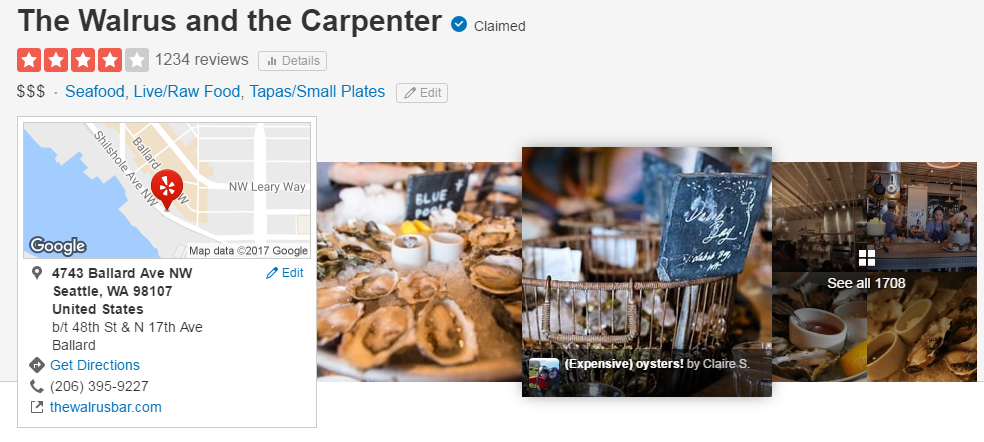
Unstructured Citations
Generally speaking, an unstructured citation is your business information (NAP) on any other site that’s not specifically a business listing directory. Common examples where you’ll find unstructured citations are blogs, magazine/newspaper sites, wikis, and so on.
Here’s an unstructured citation example for the same restaurant on seattletimes.com:
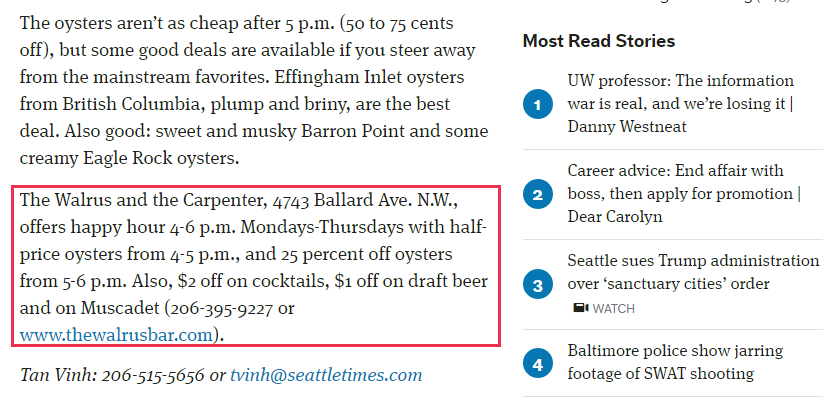
And here’s an example of an unstructured citation right here on this blog post!
The Walrus and the Carpenter is a fantastic restaurant in Seattle located at 4743 Ballard Ave N.W.. Their phone number is (206) 395-9227. The Whitespark team loves to eat here when we attend MozCon. Awesome seafood. Highly recommended!
Note that there is no link. As described above, a mention of the business without a link is still a valuable citation.
Why Citations Are Important for Local Search Rankings
Verification & Trust
Citations help search engines, like Google and Bing, verify that your business exists. When multiple credible sources have the same accurate information about your business, it signals to search engines that your business is legitimate.
Listing your business on the prominent national and local sites helps your business create authority, establish trust, and will improve your business’ ability to rank in local search results.
Prominence
Local ranking algorithms used by both Google and Bing factor in citations when it comes to local search rankings. In the latest Local Search Ranking Factors survey, local search experts rated citation related factors as making up approximately 13.31% of the Top 50 factors.
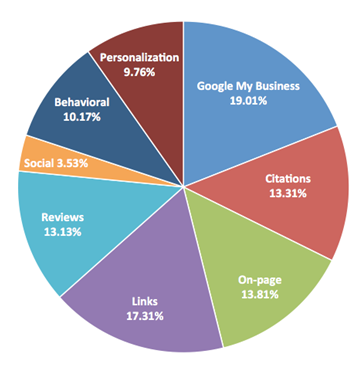
The more places your business information appears online, the more prominent your business appears to Google. It makes sense. If the search engine algorithms see that your business is mentioned on hundreds of websites, compared to competition that is only listed on a few dozen, this can make you seem like a more popular business, and give you a boost in the rankings.
Not All Citations Are Created Equal
So what makes a citation great for a local business? There is huge variation in the value of different citations. A mention of your business’ name, address, and phone number on whitehouse.gov is worth far more than a mention of your business on some spammy web directory that was created solely for low quality link building.
Since citations vary in their value, we’ve broken down our top recommended citation and data sources into different classifications by rank of importance, they are: Core Search Engines, Primary Sources, Tier 1, Tier 2 , Tier 3, and Tier 4. Below is a description of each category and some examples for businesses in the USA:
Core Search Engines
These search engines are receivers of business listing data, not distributors.
- Bing
- Apple Maps
Primary Data Sources
These are the data aggregators that aggregate and validate data from a number of sources (government, telcos, utilities, web research, etc), and then distribute this business listing data to hundreds of other sites.
- InfoGroup
- Acxiom
- Localeze
- Factual
Tier 1
These sites are prominent on Google and are frequently used by people searching for businesses. In addition to generic sites that are used nationally, this tier also includes city/state and industry/niche citations that add significant value to your citation profile.
Generic
- Yelp
- Yellowpages
- BBB
- etc.
Hyper-Local & Niche
- Lawyers.com
- Avvo
- City of Chicago.org
- Denver.com
- etc.
Tier 2
These are business listing sites that have some prominence on Google, decent domain authority, but may be lesser known.
- Yellowbook
- Merchant Circle
- HotFrog
- etc.
Tier 3
Even lesser known and lesser frequented business listing sites.
- Yellowise
- My Local Services
- Local Database
- etc.
Tier 4
Sites with low domain authority that you’ve probably never heard of. Examples:
- IGotBiz.com
- UnitedStatesSeek.com
- etc.
There are many factors that determine citation quality. For further advice on sorting the gold from the sand, take a look at this post on determining citation quality.
Citation Consistency
If you’ve read any introductory posts about local SEO, you’ve likely heard about how important citation consistency is. Making sure your listings have the correct name, address, and phone number on the most important sites in the local search ecosystem IS important. You want to make sure that you have one, and only one, accurate and complete listing on each of the most important sites.
With that said, some people worry about citation consistency more than they need to. When it comes to your local rankings and the impact incorrect citations can have, you really need to perfect your citation profile on the Core Search Engines, Primary Data Sources, and Tier 1 sites. This means making sure that you have searched for all NAP variations, all duplicates have been removed, all inconsistent citations have been updated, and you have one and only one, perfectly accurate and complete citation on each of these data sources and websites.
Your next priority would be to audit and cleanup your listings on the Tier 2 sites. There is value in getting these listings sorted as well.
If you want to keep going into the Tier 3 and Tier 4, enjoy yourself. It’s not going to hurt, but it’s also not going to make or break your SEO. A few incorrect listings on some of these less important sites are no big deal.
Another important element to remember is that Google and other Search Engines are intelligent enough to normalize business data for variations/abbreviations, so if it’s not identical to the letter or format, you don’t need to stress about it.
Oh, and if you’d rather not do all this work yourself, we would love to help you with citation audit and cleanup.
How to Build Citations for Local Businesses
Building citations is a time consuming process – it’s important to invest the time to do it right, or outsource the work to a trust and credible service provider.
Tips for building citations:
- To create listings you will need an email address – we strongly recommend that you use a business email that is associated with your company domain and not a generic Gmail or Yahoo address. Listing submissions will be more trusted and more likely to go live when you use a domain-based email.
- Your Name, Address, and Phone Number (NAP) should be the same on every site. Consistency is important, but, don’t worry about minor formatting differences that you’ll see on different sites. Again, check out our guide to acceptable variations.
- Category Selection – Try to keep your categories consistent on the sites and choose the category that best describes what your business does.
- Add as much detail as possible – Add photos, your logo, a full business description, your operating hours, links to your social accounts, and so on.
- Claim your listings – most sites will require you to verify your listing – this can be via email or for the bigger sites like Google My Business, Bing, Apple Maps and so on, through phone verification. The company will call your business and have you enter a pin number or give you a pin number to enter to claim your listing. This is very important, it’s another trust signal and verified listings have more authority.
Get started by gathering all of your business information, feel free to use our Citation Info and Tracking Spreadsheet, to stay organized and have all your information in one location.
For even more tips, see Phil Rozek’s post on Citation Building Best Practices. It’s a bit dated (2013) but most of these tips are still applicable.
Strategies For Finding Citations Sources
Now that you know what citations are and why they are important for local businesses, how do you go about finding local citations for your business?
We have good news, Whitespark has already done the legwork for you! We have been putting together citation resources and lists for years. Here are our recommendations:
#1. Start with Whitespark’s List of Top Citation Sources by Country (USA, Canada, United Kingdom, and Australia). These lists were carefully curated by Nyagoslav Zhekov, one of the foremost experts in the world on citations. You can learn more about his methodology for determining the most valuable citations here.
You can reference the lists on our site, or download the information in a spreadsheet. Work your way through all of these listings based on your country. (Note, business directories are more plentiful in the USA so this is why you are seeing a Top 50 list).
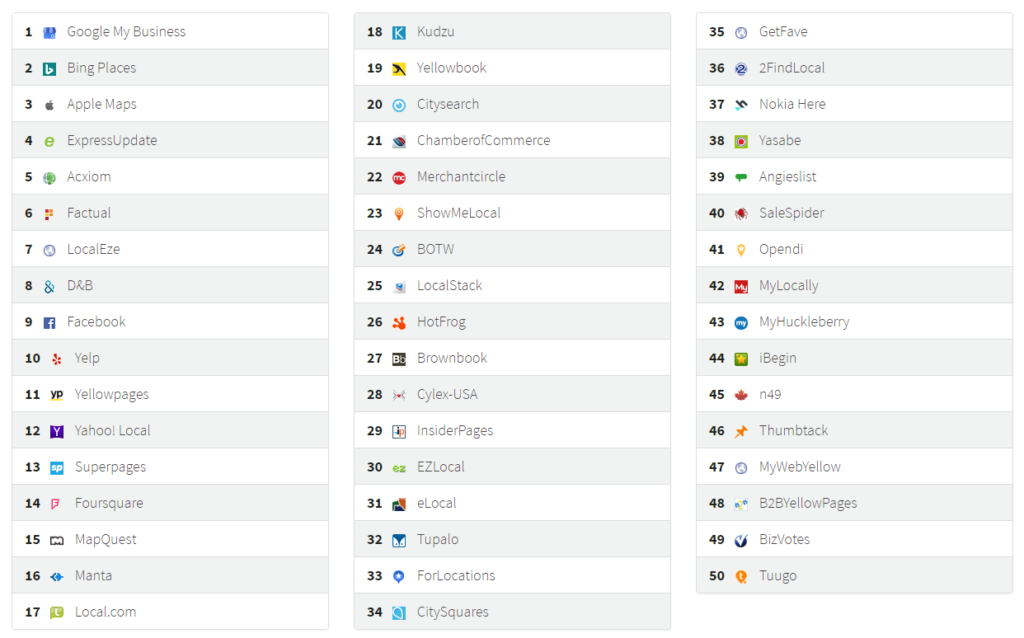
#2. Now look for citations based on your Industry/Business Category (think Accountant, Lawyer, Coffee Shop) and the City your business operates in. We’ve done hours of research, and searched hundreds of terms to find the best citation sources based on business category and location.
#3. Find local citations based on your competitors citations.
We have a handy tool called the Local Citation Finder that will complete a competitive analysis based on keyphrase search or business search. When you run a keyword search, the Local Citation Finder returns the top 3 businesses that are ranking locally for that term, then finds their citations, both structured and unstructured. By analyzing these results, you can understand the competition’s citation building strategy, see where they are getting listings, try and get listed on the same sites too.
If you are more interested in directly analyzing a specific competitors list of citations, then you can enter their business information into a business search, and look at all of their citation sources.
#4. Find citations by completing searches of your own
At the bare minimum, you most definitely should have the base citations that are in our Top lists, and we highly recommend the Local Citation Finder for additional discovery, but if you want to dig even further, you can complete some basic search queries based on your location and industry to find local citation opportunities.
Searches to find city specific citation sources:
- (city) business listings
- (city) business directory
- (city) directory
Searches to find industry/niche specific citation sources:
- (keyword) business listings
- (keyword) business directory
- (keyword) directory
Summary
Having a strong citation profile is one of the simplest ways you can optimize for local SEO. Citations are considered part of the foundational basics when it comes to local search. Once you have completed your citations you can move on to other areas like link building, engagement, content creation, and reputation management. You shouldn’t have to worry about your citation profile again, unless your business information changes – such as when you move locations, get a new phone number, change your name, and so on.
If you have any questions about citations, please leave them in the comments. We’ll answer them and possibly add more information to the post.



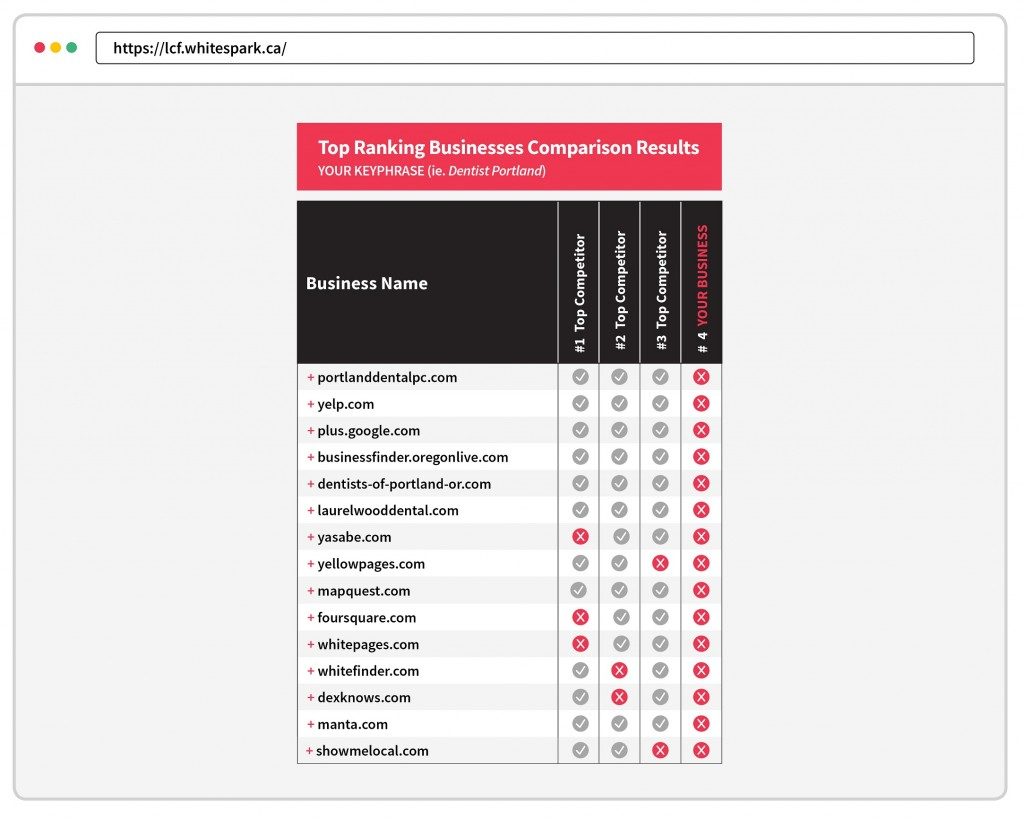
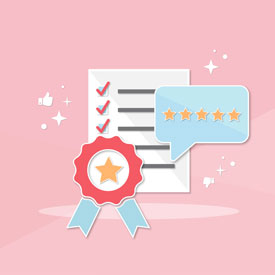
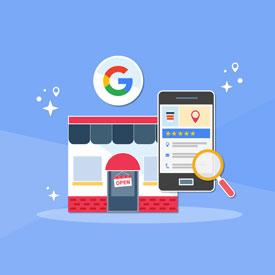



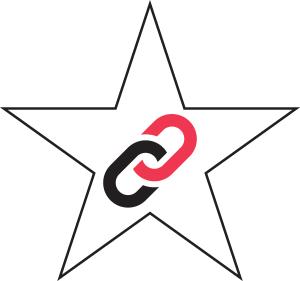




54 comments on “What is a Local Citation?”
This was a very needed piece Darren! I think one of the problems here occurs by the fact that people mistake citation in the local SEO sense with a bibliographical/scientific one. That’s why I usually refer to citations as “local citations” or “citations for local SEO”.
Actually, I believe even just the phone number might be considered a citation. A kind of an evidence could be the appearance of caller complaint directories in the “More about this place” section, when it existed long time ago. Additionally, I think one more element could be added to a citation – “category”. And it’s not necessarily the category in the sense of a business directory listing, where you hand-pick it and it is already obvious that this is the category of the business, but also in the cases of unstructured citations when the search engines need to use semantics to determine what the page on which a business citation is found is about, and thus eventually associate an appropriate category with the business. For instance, if there is an article about gardening DIY tips, and a business is mentioned a few times in it, then it is very possible that this business is a “gardener” or a “landscaper”.
Nyagoslav
Excellent post Darren. This is one that I will refer to often in the future. I especially liked the section on structured citations and unstructured citations. Thanks for continuing to put out all the “hits”
All the best,
Clark
Really appreciate the great comment Nyagoslav! Those are some important additional considerations to keep in mind. The idea of an associated citation category is very interesting. With all the work that Google is doing with entities and aspects lately, it makes perfect sense that they would be using this in citation analysis.
I know it seems obvious, but seeking out citations and links from pages that are ABOUT your topic is a smart tactic to spend some time on.
Thanks for the comment Clark. Glad you find the post useful. 🙂
Excellent post Darren – very informative. Your explanation of the difference between structured and unstructured citations and how they can both be beneficial to local business was much needed!
I also try to use the same terminology as Nyagoslav when referring to citations as “citations for local SEO” as a number of clients often tend to associate the word “citation” with referencing for scientific articles or university assignments!
Also, Nyagoslav makes a great point about search engines determining relevance and categorisation based on the semantics of a given page/article. I think this is definitely going to continue growing in importance which will make these ‘unstructured’ citations even more valuable!
Thanks for the great post,
Andrew
Great stuff, Darren. And the 2nd post in the same month, no less. Now we’re talkin’!
I really liked this point:
” It also helps you understand the competition’s citation building strategy by showing you where they are getting unstructured citations as well.”
Methinks you could write a great post on all the different (or at least the most-common) strategies for citation building – the good, the bad, and the ugly.
Thanks so much for this post Darren. As Nyagoslav said, it was very much needed.
Unstructured citations (to me) will always be an interesting and exciting part of Local Search. The reason I like them is that they are what separate the men from the boys. A little bit like with link building, it takes quite a bit of creativity to hunt down some of the best unstructured citations.
I have to say the the Local Citation Finder is absolutely invaluable for this. With the tool, we can see when a competitor has gone and gotten (whether deliberately or not) a highly valuable citation source from an authoritative site.
This makes the LCF very powerful for us! Thank you to you and your team Darren!
Great sum up Darren – of what’s needed in order to call it a citation. I agree with Nygoslav that the phone number is enough to call it a citation – so can the address in my opinion.
You can add co-citations too in my opinion.
Darren – Glad to see you’ve started adding to the conversation on citation quality. I think it’s going to continue to grow and we’ll see a lot of the services promising bulk citations to devalue greatly. While I would agree the pie chart is very unscientific, hopefully we’ll keep getting more and more information as time goes on.
Plus there’s the obvious overlap. Links/Authority often accompany citations, so there are some source domains that can be very powerful when it comes to building local influence.
If you get a chance I went into a little more detail about the growth of the spam citation issue, so drop me a comment on it if you get a chance: http://www.londes.com/ldm-blog/local-seo-citation-bubble-be-careful-with-local-directory-listings
Thanks – Mike
Great post, I have just written one myself on citations, what they are, what they do and the benefits.
I’m going to update it this week, to list some tools for people to use. Please drop by and let me know your thoughts on it.
Great post Darren! As always, excellent advice about local search. As David Mihm said and I completely agree: “unstructured citations oftentimes are the factor that’s pushing a ranking over the edge and letting it appear in the maps pack or letting it rank higher”.
Hey folks, some really solid comments here.
Mike makes an interesting point regarding bulk citation services and we are already starting to see a lot of those services cropping up. That is going to mean that the quality of unstructured citations is really going to become a competitive difference maker.
If we can think along the lines of Nyagoslav and look for unstructured local SEO citations from high quality and authority sites/pages that are well aligned with our business category then this can only help.
If Penguin and the recent link updates have taught us anything it is that relevance is a key factor in traditional ranking so it only makes sense that this would be the case in local (if not even more so).
It’s very important in Local to get the basics 100% before diving into advanced tactics as in most cases (in the UK at least) that is more than enough. Though, when it is competitive (hotels as an example) looking for more unstructured citations from high quality and relevant sources is a solid strategy (especially when everything else is being done right – earned links, reviews, website quality overall).
Cheers
Marcus
Now that more than 50% of mobile search is local, it only makes sense for our company to offer WhiteSpark’ value added citation building service to our customers.
Most people think when they hear “citation” it is the same as a directory listing. Thanks for the comprehensive discussion on the matter. This is definitely one to print out and keep.
Thanks for this, I like the usage of Unstructured and structured citations. I’ve never thought of it that way.
I think that Unstructured citations are used often too heavily for over optimization in Local SEO.
Anyway,
Great content, and thanks again.
I am learning about local SEO. Great Post.
Hello there! I came across Moz’s definition of a citation and they say “Citations are defined as mentions of your business name and address on other webpages—even if there is no link to your website.” I noticed above that you mention if a citation doesn’t contain all 3 (NAP) that it’s not a complete citation. Can you make a clarification or clear up any confusion since Moz is only saying the name and address are a citation? Thanks!
Hi Danielle,
The post says that any variation of your NAP is a citation. Just the name by itself or just the phone number would still be considered citations. Think of it as any mention of your business on the web that Google can identify and associate with your business.
So, if your business name is Acme Plumbing, and some website mentions Acme Plumbing without the phone number, Google might not know which Acme Plumbing to associate this mention with since there are dozens of businesses with the same name across the country. In this case, you’d want to make sure you also get the phone number in there so Google will know for sure which Acme Plumbing the website is referring to.
If your business name is something like “Carolyn’s Wackydoodle Scrapbooking Biz”, then chances are there are no other other businesses out there with the same name, so even just a business name mention would count as a citation.
Hope this helps to clear up any confusion.
Great post. You’re right. I worked in the legal field for over 14 years and I can assure you that only one thing comes to mind when lawyer hear the word citation – case law (e.g. 96 D.LR 4th 289). I doubt many of them are even familiar with S.E.O or why it is so important. You may have to consider bringing down the jargon one step further for some professions. I think “Google ranking” is something they could wrap their heads around.
Great article. I am from a company headquartered in India. We have established a office in CA, USA. I have been working around building citations for my company presence to rank higher on Google US . I have been reading since one hour about citations and by far your article is the most sorted one I have read.
Thanks for the clarity Darren. Even for newbie SEO’s who are getting into it and running their own niche businesses, doing SEO for themselves, friends or clients sites, can always count on you to explain things in an easy way for us all to understand. .
Your article has helped boost our page rank from page 9 for Seattle Electricians all the way to midway on page 2. Local citations carry more weight than I had ever thought. I will continue to read your articles and learn the ways of local SEO and improve our PR.
Way to go Darren!
Learned allot from this thanks posting great info
Hello from Greece, l am studing deeply Local SEO and it is the first time i recognise the value of the local citation. Apart from doing the citation without link, it is more useful in order to be a full citation to include your email and your website. So ti would definitely have a url link.
Thanks for sharing the post Darren. I have sound knowledge about local seo but I have got a clear idea about structured and unstructured citations. I know very well both are very important for Local SEO.
Hey,
thanks for the great post. I was wondering what the value would be if an Belgium site is for instance mentioned on a US site.
It often surprises my how many people don’t know what a citation is and the power a citation holds. Finally a place I can point everyone!
Thanks Darren.
Typically, people think citations are the same as directory listings. Thanks for the great in-depth explanation!
Excellent post Darren , Your explanation of the difference between structured and unstructured citations and how they can both be beneficial to local business was much needed!
I read a couple of other articles which threw too much information on my face without anything relevant. Your article was the most sorted one.
Hi Darren,
Very well explained. I suggested a client do your citation building service and as someone new to SEO, it was difficult for her to understand what a citation was just by navigating through the main pages. Just some feedback I thought I’d let you know, but love your service/resources!
Can’t believe I haven”t come across this article before! This certainly clarifies a few things for me especially the importance of citations and how they fit in with other SEO local ranking factors.
Cheers, Ilya
Very informative article for users who don’t have much IT knowledge. However i want to ask you about that partial citation (without local address) results are same as complete citation ? and if we use ANY (not real) local address does it can impact negatively in search engines ?
Great article Darren, easy to read and understand. Now I’ll have to try and translate this to my current and future customers.
Thanks – Klaas Koopman
Thank you Darren, the article is very clarifying and simple, I wanted to know more about Local Citation as I have been working on it for month but couldn’t explain to my client how important that is, now it’s simple to explain 🙂
What’s your opinion on citation building without a google local page? Do citations contribute to the credibility of a website for SEO? or are the citations only for endorsing the data in the google+ listing (and therefore there’s no point in citations until your G+ local page is published accurately)?
Great article Darren thank you, just a quick question if you have time to answer that would be appreciated. Will a citation without a link carry the same weight as a citation with a link to your website as well? Also should your company bio (if the options is given to list it) stay the same with every directory as part of your NAP or just your contact info? I’ve heard various things from various people so would like an expert opinion thanks:)
Hi Jeff, i guess i can answer on behalf of Darren 🙂 since its been a few months. Im no “expert” but i think a citation counts if Google finds the NAP on the page somewhere. With that being said, the simplest way to explain would be NAP Helps Maps, Links help Organic. If you look on Google Maps there are businesses without websites that are ranking on Maps, due to NAP’s so if you have a website it is better to put a link on the Nap but i dont think it lowers the power of NAP if you dont have a link. Hope i explained that well!
Can someone please give me an indication of the approximate number of citations that I can expect to be approved if I may have submitted to around 100 sites over the last year?
Hi Susmit, it depends on the sites you submitted to. If they seemed to be of relatively decent quality, I’d expect to see about 70% to 80% of them go live. If of questionable quality, maybe 50%. Many of the lower quality sites aren’t really managed by anyone, and they just don’t care. They set up the site with a feed of local businesses from one of the aggregators, then never bother with additions, updates, removals. They just have the site for lead gen and hope to get a trickle of leads from it.
Hi Darren,
Thank you for your help and the numbers – it will really help. You see, we listed one of our client’s website on around 160 local listing websites over the last year, but an analysis reveals that only 55 links are live as of today. This may go up to 60 or 65, considering the links we acquired over the last couple of months coming into play a bit late, but I guess based on your insights, we will have to consider the DA and activity of the websites before we can expect something fruitful from them.
Thanks again – hope to talk to you sometime soon again 🙂
Nice article on citations – they aren’t the sexiest local seo element but you definitely need them.
Great post! Excellent advice about local search. Now that more than 50% of mobile search is local, it only makes sense to make sure you have it..
It was amazing! The key factors of citation campaign, from understanding, right planning, and steps to how to do, all are gathered in one place. I have Few Q. How effective are the unstructured citations? Rich media citations and social citations will go under Unstructured citations, right?
Thank you so much for such information. I am new to the SEO world and i understand that citations are one of pillars in building a presence on the web.
Really appreciate it. Now i am going to finishing or fixing some inconsistencies.
Citations are the backbone of successful local SEO! Investing time into building citation links into your site can reap great benefits, great article!
It’s amazing what just good citations alone can do. I’ve ranked very well just using citations alone in some cases! I’m convinced that there’s a trick to getting into the top 3 in the map pack as well with them 🙂
Thanks again!
This is an excellent resource not just for seasoned SEO’s but also for helping client’s to understand what goes in to local SEO. So many of my clients have just paid someone to throw up a lot of directory links with little thought to the process and strategy.
The section around unstructured citations was something that I read with keen interest as it is something I have been testing for months now and seeing very good results when used as suggested in this article. Top stuff.
Great post! Found many of the tools really helpful, specially the Local Citation Finder. I’ve been working my way around unstructured citations with some clients and the results are fantastic, so I’m glad to see it included in a section of its own.
So if I was to add these sites pointing to my site for the term psychic or meditation group whatever, I put the terms/keywords in the description and it helps makes that relevant?
Yelp is good. I have had very good success with Yelp and some local Yellowpages. I like Quora too, not sure if quora falls in line with local citation though. What I liked is using virtual addresses for local citation.
I stumbled on your article by searching for local SEO techniques to use, and as someone new to local SEO, this was one of the most engaging articles, filled with useful information. Thanks Darren! I look forward to putting the knowledge you shared to use!
Darren, thanks so much for your invaluable information. I’m about as technologically challenged as they get. And with a very tight budget, I’m trying hard to stay ahead of the SEO curve and get leads at the lowest cost. Believe me, there are tons of SEO companies that have swallowed up my money with no results. Now I’ve resolved to learn the ropes and do whatever I can possibly do before handing over the job to someone else and pay through my nose. And of course while this is happening, I’m getting to know who the real knowledgeable and professional people are. You are certainly up there on my list of people to contact when I’m ready pass on the baton.
Awesome info, as always, Darren. It’s about time you start adding to the citation quality conversation (there is a lot of low effort stuff out there, that’s for sure). I think the problem is a lot of “professionals” don’t get the basics of local SEO and jump into “what’s hot,” which often isn’t the way to go, especially in the States and Canada, where I operate from (I am sure UK is quite competitive as well). Knowing the fundamentals, just like you described them in a post, is an excellent kick-start. Great job, boss!
this is a really awesome article. A lot of basic knowledge that was skipped when I first started learning SEO. The most informative to me were the tier groups. I have always looked a citation based on their domain strength not realizing that this was an error. I starting using the whitespark citation tool in september and it has been absolutely amazing.
Comments are closed.